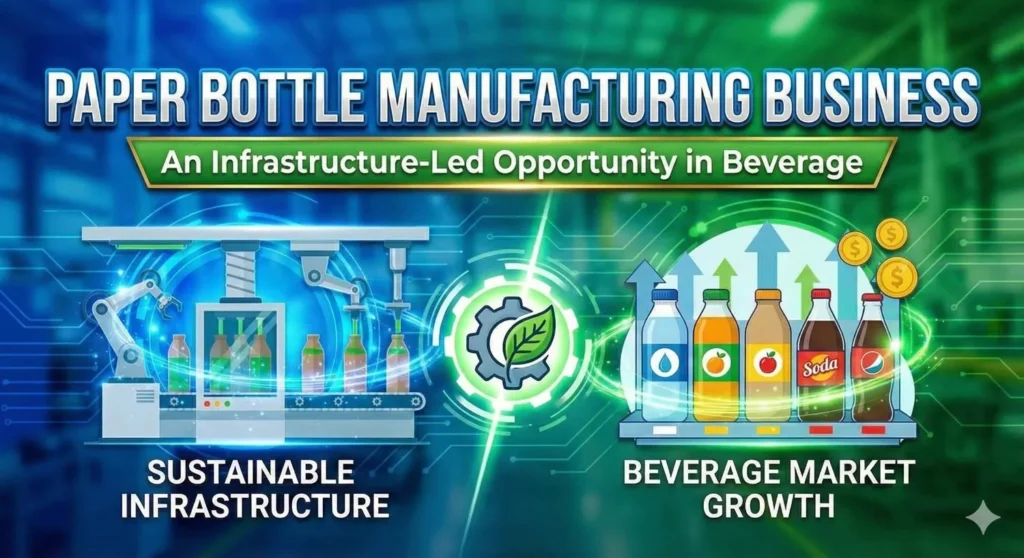Food manufacturing is a vital segment of the food industry, involving the processing and packaging of raw ingredients into finished food products ready for consumption. It plays a key role in ensuring food quality, safety, and availability at scale. With advancements in technology, automation, and quality control, modern food manufacturing has become more efficient, sustainable, and responsive to consumer demands. From packaged snacks to ready-to-eat meals, the sector offers vast opportunities for innovation and growth, making it an attractive area for entrepreneurs and investors alike.
Contents
- 0.1 Opportunities for SMEs in the Food and Beverage Industry in India:
- 0.1.1 Health and Wellness Products
- 0.1.2 Packaged Foods
- 0.1.3 Beverages
- 0.1.4 Local and Regional Products The variety of food that India has makes it a great avenue for ISMS to tap into their regional speciality. Local authentic products based on India€™s vast culinary traditions are always in demand. Marketing of regional sweets, snacks, specialised drinks etc of India based sames will create its niche due to India€™s cultural heritage. The market for this is huge, not just in India but outside too, since people still want the flavour of various parts of the country.
- 0.1.5 Food Processing
- 0.2 Challenges SMEs Face in the Food and Beverage Industry in India:
- 0.3 How to Leverage These Opportunities:
- 1 Frequently Asked Question
Opportunities for SMEs in the Food and Beverage Industry in India:
Smaller businesses will find many chances to grow because this sector continues to expand. Here are some key areas where SMEs can focus:
Health and Wellness Products
People want to eat and drink healthier options. The rising interest in fitness and health drives the market for protein snacks alongside vegan and low calorie drink options. SMEs have the chance to produce speciality items that meet dietary needs by creating organic foods without gluten and nutrient-abundant products. Indian food and beverage trends create chances for small businesses to succeed with healthier product lines.
Packaged Foods
Many Indian families depend on prepackaged meals. Most customers prefer packaged food since they save time and stay fresh longer. Small companies can create market advantages by introducing regionally-specialised food products to consumers. Local families buy large quantities of traditional namesakes and pickles because they enjoy familiar snack tastes. Companies improve their market position through enhanced shelf life products so they can invest in better packaging and fresh concepts.
Beverages
The Indian beverage business shows substantial market expansion in different segments. The RTD beverage market including juices and health drinks expands each day. Companies of all sizes have started producing cold-pressed juices along with bottled teas and flavoured milk drinks because more people want to buy them. Small companies in this industry can lead the market by creating organic and sugar-free beverages with exceptional flavour combinations.
Also Read
Local and Regional Products
The variety of food that India has makes it a great avenue for ISMS to tap into their regional speciality. Local authentic products based on India€™s vast culinary traditions are always in demand. Marketing of regional sweets, snacks, specialised drinks etc of India based sames will create its niche due to India€™s cultural heritage. The market for this is huge, not just in India but outside too, since people still want the flavour of various parts of the country.
Food Processing
Food processing has emerged as a critical part of India€™s food and beverage industry in India and it has also a place for the SMEs also involved in it. Factors that contribute to the growing need for more processed foods in perfect preservation and safety standards are responsible for growth in this sector. Food processing equipment, packaging and supply chain management will be small businesses focus. Moreover, with the growing demand for building materials for storage, SMEs can also offer ideas for refrigeration and transport.
Also Read
Challenges SMEs Face in the Food and Beverage Industry in India:
There are many opportunities but challenges exist for SMEs within the food sector. These include:
Supply Chain Management
For SMEs, a well managed supply chain is necessary to assure timely order performance and provide quality products. Business growth can be slowed if raw material costs fluctuate, the operative’s experience is unreliable supply chains, and product quality is inconsistent. As a result, SMEs have to join forces with reliable material suppliers so they can buy quality raw materials and operate without interruption.
Quality standards and regulations are one of the inputs of the process.
India regulates their food and beverage industry. You need to comply with strict food safety standards, labelling requirements, and quality certifications for the SMEs. However, meeting these regulations is very difficult, particularly for small businesses with scarce resources. However, with these regulations also comes an opportunity for SMEs to differentiate themselves through the sale of high quality products, producing to international standards.
Our Project Reports
Marketing and Branding
Therefore, any food manufacturing business has to build a strong brand presence to get success. SMEs often find themselves with little budgets to spend on marketing and the means to reach a larger audience. Yet with the advent of social media and digital marketing, small businesses can now serve their products more efficiently as well as affordably. These platforms can enable companies to bring their high quality products to the limelight and connect with their audience.
Raw Material Costs and Supply
Food manufacturing businesses rely on the raw materials that generate a substantial cost. SMEs have to not only manage their expenses but are also in need of ways to source raw materials in cost effective ways. Reducing the operating cost is achieved through partnerships with reliable material suppliers with competitive pricing and high quality of materials.
How to Leverage These Opportunities:
Small and medium enterprises (SMEs) involved in the food and beverage sector should use innovation and quality as the tools for success in India. Small businesses can make a profit by tapping into some new emerging trends like ready to eat products, regional specialities, and health conscious food. Furthermore, technology can be used for better supply chains and online sales and marketing.
From leading technology in supply chain services to leveraging technology for sales and marketing. For instance, if you are an enterprising businessman interested in embarking on a food manufacturing business, it will do you a lot of good getting your raw materials from dependable material suppliers and plenty of quality products. Working with companies that focus on supplying building materials for food packaging and storage can also aid in your business operations.
For expert resources and business solutions for starting your food manufacturing business, visit NIIR.org.
Our Books
Conclusion
The opportunities available for Indian SMEs in the food and beverage industry is enormous. Small businesses can tap into the increasing demand of food products by keeping up to date with advanced emerging trends, ensuring quality and ensuring supply chains are managed well. While many challenges confront the Indian and global food markets, the right strategies can enable SMEs to take advantage of the full potential of this dynamic sector.
Contact Us
Frequently Asked Question
What are the key opportunity areas for SMEs in India’s food manufacturing sector?
There’s strong demand across health and wellness foods, packaged foods, beverages, and local or regional speciality products. SMEs can build niche brands in organic, gluten-free, nutrient-rich items, cold-pressed juices, traditional snacks, and regional delicacies that appeal to both domestic and export markets.
How can food processing and related services benefit small food manufacturers?
Food processing is a fast-growing segment where SMEs can find roles in preservation, packaging, and value-added products. This includes everything from refrigerated storage and transport to manufacturing ready-to-eat meals and quality-controlled packaged snacks.
What government schemes support SMEs in the food manufacturing industry in India?
Multiple initiatives such as PMFME (Pradhan Mantri Formalisation of Micro Food Processing Enterprises), Production Linked Incentive schemes, and other food processing incentives provide financial assistance, credit support, and marketing aid. These help SMEs scale operations, modernise facilities, and explore exports.
What challenges should SMEs expect when entering the food and beverage manufacturing sector?
Common challenges include managing the food supply chain, meeting strict safety and labelling standards, maintaining consistent raw material quality, and investing in branding and marketing to stand out in a competitive market.





